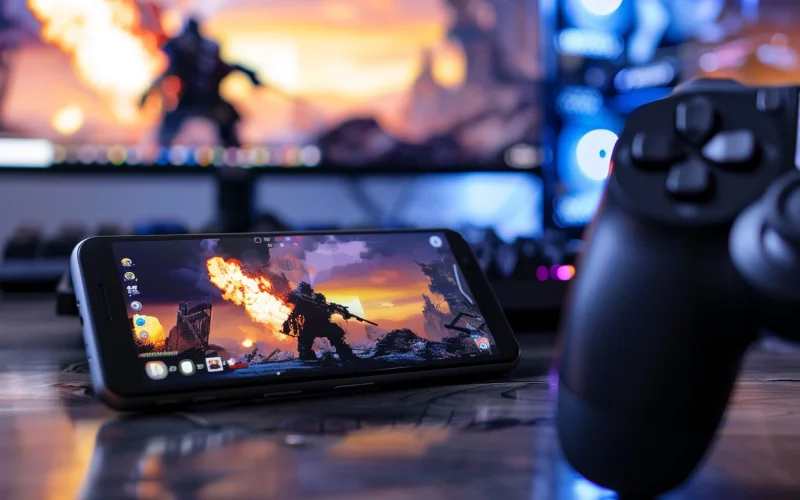Introduction
The world of entertainment is evolving rapidly, with mobile gaming at the forefront of this transformation. As smartphones become more powerful and accessible, mobile gaming is emerging as a dominant form of entertainment, reshaping how people interact with digital content.
The Rise of Mobile Gaming

Mobile gaming has grown exponentially over the last decade. What began as simple games like Snake on early mobile phones has now evolved into a multi-billion-dollar industry. The widespread adoption of smartphones and affordable internet connectivity have been key drivers of this growth. In 2024, mobile gaming represents over 50% of the global gaming market, outpacing traditional consoles and PCs.
Why Mobile Gaming Appeals to Everyone
Mobile gaming has a unique ability to appeal to a broad audience. This accessibility stems from several factors:
- Affordability: Unlike console or PC gaming, mobile games often require minimal investment beyond owning a smartphone.
- Convenience: Gamers can play anywhere, anytime, turning idle moments into engaging experiences.
- Variety: From casual puzzle games to competitive multiplayer titles, mobile gaming offers something for everyone.
Mobile Gaming and the Growth of Streaming

Streaming platforms like YouTube and Twitch have become huge, and mobile gaming is joining the trend. Many gamers now stream their mobile gameplay to a live audience. People watch these streams to learn new strategies, enjoy the excitement of competitions, or just have fun. Streaming makes mobile gaming even more social, allowing viewers to interact with gamers in real time. This has helped mobile gaming reach new heights in terms of popularity and visibility.
The Role of Mobile Gaming in Learning and Education

Mobile games aren’t just for fun; they can also be a tool for learning. Many educational apps and games help kids and adults develop skills in subjects like math, language, and problem-solving. Games that challenge the brain, like puzzles and logic games, can improve memory and critical thinking. By making learning interactive and fun, mobile gaming is becoming an important part of modern education, especially for younger generations who are used to learning through technology.
Mobile Gaming and Creativity

Mobile games also give players the chance to express their creativity. Many games, like Minecraft or Roblox, allow users to build their own worlds, designs, or even create their own games. These games encourage players to use their imagination, plan, and create something from scratch. This level of creativity has attracted millions of players and has helped mobile gaming grow into a platform where people not only play but also create content.
Mobile Gaming’s Environmental Impact
While mobile gaming is growing rapidly, it’s also important to consider its environmental impact. The production and disposal of smartphones, as well as the energy needed to power mobile gaming, can contribute to pollution. However, some game developers are becoming more aware of this issue. They are working to reduce the energy used by their games, improve the sustainability of devices, and encourage eco-friendly practices among gamers. As mobile gaming continues to grow, it’s important to balance entertainment with environmental responsibility.
Innovations Driving the Mobile Gaming Industry

Technological advancements have significantly enhanced mobile gaming:
- Cloud Gaming: Gamers can now stream high-quality games on their devices without needing expensive hardware.
- AR and VR Integration: Augmented and virtual reality experiences, like Pokémon GO, elevate user engagement.
- Microtransactions: In-game purchases have revolutionized monetization strategies, enabling developers to provide free-to-play games while earning revenue.
Impact of Mobile Gaming on Entertainment
Mobile gaming is reshaping traditional entertainment in several ways:
- Interactivity: Unlike passive forms of entertainment like movies, mobile games demand active participation.
- Social Connectivity: Multiplayer games and leaderboards encourage interaction and foster community.
- Cross-Media Influence: Mobile games often inspire movies, merchandise, and even esports tournaments.
Mobile Gaming’s Popularity Among All Ages

One of the biggest reasons mobile gaming has become so popular is that it appeals to everyone. Whether you’re a young child or an older adult, there’s a game for you. Simple games like Candy Crush or Angry Birds are great for casual players, while more complex games like PUBG or Call of Duty attract serious gamers. Since most people have smartphones, anyone can access these games with just a few taps. This wide accessibility is a major factor in mobile gaming’s rapid rise.
How Mobile Gaming Connects People

Another great thing about mobile gaming is how it brings people together. Many mobile games allow players to connect with others online. Whether it’s teaming up with friends or competing with people from around the world, mobile gaming fosters a sense of community. Social games like Fortnite or Clash of Clans encourage teamwork and friendly competition, helping players bond over shared experiences. This social aspect has made mobile gaming even more appealing.
Mobile Gaming’s Impact on Traditional Entertainment
Mobile gaming is also changing traditional entertainment, like watching movies or TV shows. While TV shows and movies are passive forms of entertainment, mobile games require active participation. Players have to think, plan, and make decisions, making it a more engaging experience. As a result, mobile gaming is becoming the preferred choice for many, especially younger audiences who crave interactive and fast-paced entertainment.
Mobile Gaming’s Influence on Other Industries

Mobile gaming has a big impact outside the entertainment world. For example, successful games are often turned into movies or TV shows. Games like Angry Birds and Sonic the Hedgehog have been made into films, creating even more ways for fans to enjoy them. Mobile games have also influenced other industries, like fashion and advertising, where brands partner with games to reach their audiences. The growth of mobile gaming is helping to create new opportunities across different sectors.
The Role of Game Developers in Mobile Gaming Growth
Game developers play a huge role in making mobile gaming what it is today. They constantly innovate, creating new types of games and improving graphics, gameplay, and user experience. Developers also listen to players, making updates based on feedback. As more people join the mobile gaming world, developers are finding new ways to keep them engaged, such as adding multiplayer modes, daily challenges, and special events. Their work is key to the future of mobile gaming.
Mobile Gaming and the Rise of Esports

Esports, or competitive gaming, has seen a massive increase in popularity. While traditional esports were mainly focused on PC and console games, mobile gaming has opened the door for a whole new set of players and teams. Games like PUBG Mobile and Clash Royale now host large tournaments with cash prizes, bringing professional gaming to a global audience. The rise of mobile esports is making gaming more accessible to both players and viewers, further cementing mobile gaming’s place in the future of entertainment.
Challenges in the Mobile Gaming Industry
Despite its success, the mobile gaming industry faces hurdles:
- Monetization Models: Over-reliance on microtransactions can lead to negative user experiences.
- Market Saturation: The sheer number of mobile games makes it difficult for new entrants to stand out.
- Data Privacy Concerns: Collecting user data for targeted ads raises ethical and legal questions.
Future Trends in Mobile Gaming

The future of mobile gaming looks promising:
- 5G Technology: Faster internet speeds will enable smoother gameplay and more immersive experiences.
- AI-Powered Games: Artificial intelligence will enhance personalization, making games more engaging.
- Cross-Platform Play: Seamless connectivity between mobile and other gaming platforms is on the horizon.
Analysis Table: Mobile Gaming vs. Traditional Gaming
| Aspect | Mobile Gaming | Traditional Gaming |
|---|---|---|
| Accessibility | High | Medium |
| Cost | Low to medium | High |
| Portability | Excellent | Limited |
| Variety of Games | Extensive | Limited by platform |
| Community Engagement | High | High |
| Innovation Speed | Fast | Moderate |
Comparative Table: Mobile Gaming Industry Analysis
| Factor | Advantages | Challenges |
|---|---|---|
| Technology | Constant innovation in AR/VR and 5G | High competition and complexity |
| Market Reach | Global accessibility | Oversaturated market |
| Monetization | Flexible models like freemium | Ethical concerns with microtransactions |
Conclusion
Mobile gaming has transformed entertainment in ways we couldn’t imagine a few years ago. It is convenient, affordable, and connects people across the globe. While challenges like ads and data privacy remain, the future is bright with advancements in technology like VR and AI. Mobile gaming is more than just fun it’s shaping how we work, learn, and connect. With its constant growth, mobile gaming will continue to be a major part of the entertainment industry for years to come.










